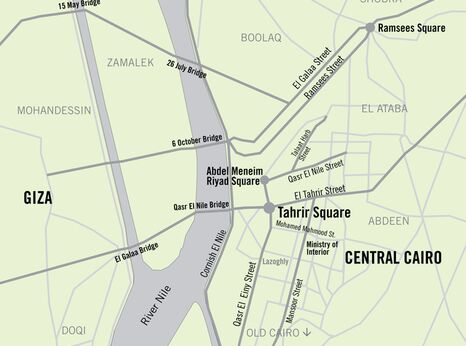Egypt: Twelve men risk execution after unfair trial

On 14 August 2013, Egyptian security forces killed at least 900 individuals and injured more than a thousand others during the dispersal of sit-ins in Rabaa al-Adawiya and al-Nahda squares in Greater Cairo against the ousting of former president Mohamed Morsi on 3 July 2013. According to official statistics, six security officers were killed during the Rabaa al-Adawiya dispersal and three others during protests two days later. In the build-up and aftermath of the sit-in dispersals, the authorities rounded up hundreds of leaders, members and supporters of Muslim Brotherhood, other protesters and journalists.
On 8 September 2018, a terrorism circuit in Cairo’s Criminal Court handed down 75 death sentences, 47 life sentences and heavy prison terms ranging from 15 to five years to 612 people, while the remining five died in the course of the trial. Amnesty International considered the trial to have been grossly unfair. On 14 June 2021, the Court of Cassation upheld the death sentences against 12 men, commuted the death sentences of 31 men and upheld the prison sentences. No one was acquitted by either court. The Cairo Criminal Court and the Court of Cassation failed to establish individual criminal responsibility against the defendants in the mass trial and did not order investigations into allegations made by defendants of being subjected to enforced disappearance and torture following their arrests. Lawyers told Amnesty International that the judge presiding over the initial trial exhibited clear bias against the defendants. He publicly expressed criticism of the Rabaa Al-Adawiya sit-in and members and supporters of the Muslim Brotherhood, while the trial was still ongoing, in a verdict related to another case, examined by Amnesty International. Defence lawyers also complained about the presiding judge limiting their ability to cross examine prosecution witnesses and to examine witnesses on behalf of the defendants. Lawyers also highlighted concerns over violations of the right to effective legal assistance including the authorities’ refusal to allow them to consult their clients in private. Lawyers also considered that the Court of Cassation did not conduct a genuine review on the issues in the case, including reviewing the sufficiency of incriminating evidence and did not even allow them to present their pleadings on the facts of the case. The Court convicted all defendants of all the charges against them, without establishing individual criminal responsibility. In doing so, the court relied on the draconian law on assembly (Law No. 10/1914), which attributes individual criminal responsibility to all participants of a gathering of more than five people held with a purpose of “committing a crime, or obstructing or delaying the implementation of laws and regulations” or seeking to “influence the authorities” for any crimes committed during the gathering as long as participants were aware of its aim (articles 2 and 3 of Law No. 10/1914) and article 32 of the Penal Code, which allows for the application of the most severe penalty if a single act amounted to multiple crimes, or if multiple crimes were committed for a single criminal purpose. Six of the men who were convicted and sentenced to death were in custody in July 2013, before the dispersal of the Rabaa Al-Adawiya Square sit-in in August 2013, demonstrating the fragrantly flawed nature of the verdict. The verdict does not provide any rationale for imposing different penalties on those convicted, even though all were convicted of the same charges.
Egyptian authorities do not announce execution plans and frequently fail to inform families or lawyers of the day of the execution or allow them a final visit in violation of Egyptian law. The Egyptian authorities have accelerated their use of the death penalty since October 2020, exacerbating fears that the 12 men’s executions are imminent. This year alone, the authorities have executed at least 74 men and women according to media reports. In 2020, Egyptian authorities executed at least 107 individuals, making Egypt the third top executioner globally.
Five of the 12 men , who are held in Tora Maximum Security 1 (colloquially known as Scorpion Prison), have been barred from family visits and have been held in indefinite solitary confinement since their arrest, violating the absolute prohibition of torture. Other prisoners also complained about having no or insufficient access to fresh air, sunlight or time outside their cells and the prison authorities’ refusal to provide them with basic necessities including sufficient and nutritious food, clothes and items for personal hygiene, even when costs were covered by prisoners or their families. Five of the men also reported being beaten and insulted by prison guards. Eight men complained of being denied access to adequate medical care, including medication for pre-existing conditions and failure to transfer them for needed medical examinations or other treatment in hospitals outside prison. Amnesty Intonational had previously documented how prison authorities in Egypt hold political opponents in particularly cruel and inhuman detention conditions and deliberately deny them healthcare with the aim of punishing dissent.